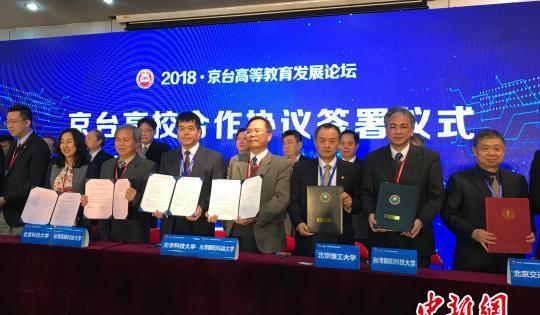
On December 4, the 2018 Beijing-Taiwan Higher Education Development Forum was held in Beijing. A number of universities on both sides of the strait signed inter-university cooperation agreements during the forum to pragmatically promote higher education exchanges between Beijing and Taiwan and promote the integrated development of higher education in Beijing and Taiwan. Photo by Lu Mei
Beijing, December 4 (China News Network) (Reporter Lu Mei) The 2018 Beijing-Taiwan Higher Education Development Forum was held in Beijing on the 4th. More than 120 university presidents, experts and scholars from more than 50 colleges and universities on both sides of the strait attended the meeting.
According to reports, the forum is hosted by the University of Science and Technology Beijing, with the theme of "cross-strait integration and co-creation of first-class", with scientific and technological innovation as the core, and platform construction as the starting point, to comprehensively promote the integration and development of Beijing and Taiwan universities in the fields of talent training, teaching management, teacher exchanges, scientific research, and integration of industry and education, and accelerate the construction of first-class universities and first-class disciplines. It aims to give play to the role of education in cultural identity and education in cross-strait exchanges, consolidate cross-strait education consensus, and create a new platform for cross-strait exchanges and cooperation.
Quan Liangzhu, deputy secretary of the Party Committee of the University of Science and Technology Beijing, said in his opening speech that the forum is an important platform for exchanges and dialogues between colleagues in the higher education circles in Beijing, Tianjin and Hebei and Taiwan. Seeking development in the course of exploration and seeking win-win results in cooperation has become an important consensus of the educational circles on both sides of the strait. In the construction of first-class colleges and universities and first-class disciplines, colleges and universities on both sides of the strait have greater space and efficiency for cooperation because of their geographical proximity, blood ties, and deep cultural ties. It is hoped that higher education workers on both sides of the strait will have close exchanges, share each other's experiences, and explore new ideas for cross-strait educational cooperation.
Li Tianren, president of Taiwan's Huafan University, expressed the hope that colleges and universities on both sides of the strait will further enhance mutual understanding of students, teachers, and courses, and that exchanges at all levels, from academic research to teaching, and even life experience, can be carried out at the same time.
Zhang Hengrui, honorary president of the Taiwan Association of Chinese Leaders and Elites, pointed out that this year there has been a substantial increase in the number of Taiwanese students applying for and applying for mainland colleges and universities, and the number of Taiwanese colleges and universities has increased several times over previous years, and more and more Taiwan college graduates are willing to work on the mainland. After Taiwan's "nine-in-one" election, cross-strait exchanges in colleges and universities can be expected to develop more benignly.
At the main forum, Liu Gonghui, president of Beijing University of Technology, Zheng Daoming, president of Chaoyang University of Science and Technology in Taiwan, and Lv Zhaoping, vice president of University of Science and Technology Beijing, delivered keynote speeches on the themes of talent training under the background of "double first-class" construction, collaborative innovation and development of industry-university-research in colleges and universities, and innovation and cooperation under the guidance of science and technology policies.
Experts and scholars from colleges and universities on both sides of the strait also separately discussed such topics as exchanges and cooperation between colleges and universities on both sides of the strait and the modernization of education, scientific and technological innovation and personnel training in higher education on both sides of the strait, and the coordinated development of higher education production, study, research, and application on both sides of the strait.
During the forum, the University of Science and Technology Beijing signed inter-university cooperation agreements with Taiwan's Chaoyang University of Science and Technology, Kaohsiung University of Science and Technology, Beijing Institute of Technology and Taiwan's Chaoyang University of Science and Technology, Beijing University of Posts and Telecommunications and Taiwan Jiaotong University, Beijing Jiaotong University and Taiwan Donghua University, Beijing Union University and Taiwan Shude University of Science and Technology, etc., to pragmatically promote higher education exchanges between Beijing and Taiwan and promote the integrated development of higher education in Beijing and Taiwan. (End)